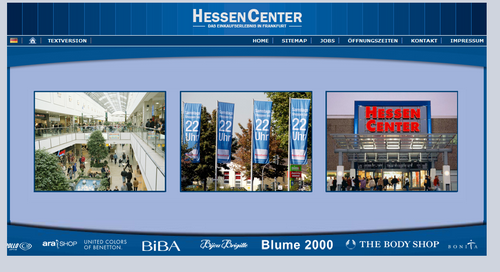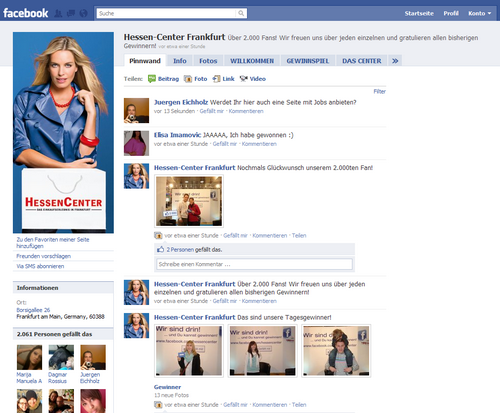Im Herbst 2010 saß ich in einem Meeting zu einem deutschen Forschungsvorhaben, bei dem Zwischenergebnisse aus den Untersuchung auch auf Facebook bekannt gemacht werden sollen.
“Was ist Facebook?”, frug daraufhin ein teilnehmender Vertreter aus der Industrie. “Bei uns werden all diese Seiten immer gesperrt von der IT, wir können da praktisch gar nichts machen”.
“Facebook?..nee, lieber nicht”, antwortete eine andere Vertreterin aus der Industrie, “..bei uns ist das alles sehr restriktiv, wir haben auf unserer Website auch keine Infos über Forschungsvorhaben”.
Meine Schwester, Juristin & als Mutter 24h dauerbeschäftigt, gehört auch zu denjenigen, die “diesen ganzen Quatsch” ablehnen. Keine Zeit, “keinen Bock auf Daten von mir online”, keinen Nerv auf die Zeitverschwendung – alles Gründe, wieso sie da nicht mitmacht. Ich bin da zwar anderer Meinung, weil ich mein Geld teilweise auch mit “diesem Quatsch” verdiene, respektiere aber diesen – für sie – logischen Entschluss. Freilich, was bringt ihr die Teilnahme?

…neulich an der Kasse beim Alim Market in der Kaiserstraße.
Facebook muss man nicht mögen, ich habe es in der Vergangenheit gehasst, ich bin kein großer Fan von social networks im Stil von Facebook (oder noch schlimmer: Xing & LinkedIn), aber ich nutze es mittlerweile gerne weil es mir den Kontakt mit anderen ermöglicht, genauso wie Twitter.
Ich nutze Facebook auch deswegen, weil in anderen Ländern als Deutschland Facebook quasi DIE Eingangsplattform für social activities ist. Verbunden mit einem in manchen Ländern kostenlosen Mobilfunkzugang zum mobilen Angebot von Facebook via http://0.facebook.com, muss man sich dann auch nicht wundern, wenn die Jugend bei Facebook & Co. abhängt. Wohlgemerkt, weltweit. Genau so wie der Rest des Internets 24/7/365 offen ist (wenn wir mal von ein paar deutschen Ausnahmen absehen).
Facebook bietet all das, und eben noch viel mehr als Xing & LinkedIn aus bewussten Gründen sein werden und vielleicht auch nicht sein wollen. An Facebook führt also irgendwie kein Weg vorbei – denken sich sicherlich auch die professionellen Facebook Marketer in Deutschland.

Eben komme ich aus dem Einkaufszentrum hier in Frankfurt-Ost – dem Hessen-Center, das gerade eine Aktion für Kunden startet und für die Teilnahme an deren Hessen-Center Facebook Seite wirbt:
http://facebook.com/hessencenter
….steht da in der Mitte auf dem Plakat im Center. Nicht etwa http://www.hessen-center-frankfurt.de, nein, facebook.com/hessencenter. Und daneben ein überdimensionaler “Gefällt mir” Button. Facebook.com/xyz als neue ID?

Zugegeben, die richtige Website ist jetzt auch nicht so der Burner. Aber was möchte man auf der Website eines EKZs schon erfahren – ausser der Öffnungszeiten und vielleicht noch der verfügbaren Geschäfte? Bemerkenswert übrigens der Link zu den Jobangeboten.
Obwohl, das könnte man doch eigentlich auch direkt erfragen, nicht wahr? Also ab damit auf die Pinnwand: “Werdet Ihr hier auch eine Seite mit Jobs anbieten?”

Die Kommunikation läuft also über die Facebook Pinnwand, man ist beim Du (praktisch, direkt) und ich (ich kleines ich) spreche mit a) der Welt und b) dem HessenCenter (wo natürlich nur eine Agentur bzw. ein Student sitzt, der die Kommunikation macht). Kommunikation! Konversationen! Cluetrain? Hach….
Ich erwähne das alles, weil:
-
ich mich ob der angepriesenen URL wundere: facebook.com/eigenername vs.
http://www.eigenername.de, und inwieweit es ein Vorteil ist für Firmen, wenn sie Teil eines Netzwerks sind;
-
ich mich über solches direktes Facebookmarketing freue, aber auch wundere, weil es doch gefühlt noch so viele Nichtnutzer gibt und man damit nicht alle erreichen kann;
-
ich mich wundere, ob die Firmen und Projekte wirklich alle bereit sind für eine offene Kommunikation? Konversationen mit dem Kunden! Dabei geht es ja nicht immer nur um Firma X, die ein Produkt Y verkaufen möchte. Ein gutes Beispiel hierfür ist die Stadt Frankfurt, die bei Facebook über das Presse- und Informationsamt einen
Facebookkanal bedient. Machen die gut, wie ich finde, aber viele Teilnehmer und “Gefällt mir”-Klicker nutzen deren Facebook Pinnwand als direkten Rückkanal – und äußern darüber ihren Unmut zur Stadt UND eben allem was dazugehört. Which includes the RMV und all das was der gemeine Bürger sonst noch nicht voneinander abtrennen kann und vielleicht auch nicht muss. Ich, die privaten Firmen, dort die öffentliche Hand und ach ja, die Steuern und überhaupt, macht mal was für unsere Steuern! 11!1! So etwa. So liest sich das auf den Seiten teilweise. Das ist normal und menschlich (und eben nicht so sachlich);
-
ich mich frage, ob Firmen “Marketing” auch als ein Solches verstehen, oder hier den bloßen Verkauf von Produkten sehen (vielleicht auch nur weil es ein für sie messbarer Erfolg ist und sie weiterbringt). Beispiel:
Bahnaktion im Herbst 2010 mit dem Verkauf von Tickets über Facebook. Meiner Meinung nach war das ein bloßes Antesten der Bahn über deren altgediente Agentur, ob Facebook als Verkaufsplattform taugt. Die Kunden sahen es anders und äußerten ihren Frust auf der Pinnwand über Stuttgart21, die Verspätungen und was sonst noch im Makrokosmos Deutsche Bahn abgeht. Direkt, auf Antwort hoffend. Die natürlich auf sich Warten ließ, dann aber gut kam. GENAU DARUM GEHT ES meiner Meinung nach. Um Kommunikation! Mit den Kunden sprechen, direktes Feedback geben. Das Angebot kann noch so scheisse sein – wenn die Kommunikation stimmt, ist schon vieles gerettet. Zum
Kundenservice in Deutschland hat auch Volker Weber gerade wieder etwas gebloggt. Traurig, aber wahr..
Bloßes Verkaufen geht meiner Meinung nach (als gelernter Kfm.) über den Preis, über Qualität oder übers Image. Wenn die Bahn Tickets verkaufen möchte, stelle ich mich gerne 3 Tage auf die Zeil in Frankfurt und verkaufe da sicherlich noch mehr Tickets als die über Facebook. Verkauft haben sie übrigens lt. dem oben verlinkten Interview mit der Agentur und dem Bahntypen blendend. Gegenüber meinem Kunden würde ich als Agentur in der Öffentlichkeit aber auch nur positives berichten.
Daher: Facebook ist vor allem eine Kommunikationsplattform (yeah, “-plattform” :-), kein Verkaufskanal.
-
Ich erwähne es auch, weil ich mich immer wundere, wo diese rasante Entwicklung mit Facebook noch hinführen wird. Dass im Internet nichts von Dauer ist und alles vergänglich ist, ja sogar peinliche Sucheinträge aus der Jugend (“das Internet vergisst nicht”) in der Masse und aufgrund von Suchmaschinenoptimierungsmaßnahmen sowie demand media Flut untergehen, scheint mittlerweile immer mehr bewusst zu werden. Allein: Facebook kann sich Dinge erlauben, die andere Firmen in den Ruin treiben würden. Verschleierte Privacy Maßnahmen, einen unreifen CEO mit schlechter Menschenkenntniss und ein sich ständig wechselndes Layout bzw. Benutzersteuerung sind da nur einige der Gründe, die Position von Facebook kritisch zu hinterfragen.
Siehe Delicious.com, der social bookmark service von Yahoo!. Yahoo!, diese mittlerweile chinesische Firma. “Geleakt” (wuaarrgh), ist deren slide zur bevorstehenden Schließung von Delicious, dann am nächsten Tag Kommando zurück, delicious wird – wenn überhaupt – verkauft, aber eigentlich ist das alles egal, denn die Menschen brauchen Vertrauen. Vertrauen, dass sie in Delicious nicht mehr haben und dementsprechend abwandern. Eigentlich sehe ich es wie einige Andere, dass Delicious durch die abwandernden Nutzer kaputt gemacht wird, und nicht durch Yahoo!s falsche Geschäftspolitik, aber mittlerweile habe auch ich zu Diigo.com gewechselt. Nicht weil Delicious so schlecht ist, sondern weil mir bei dieser News erst gezeigt wurde, dass es auch noch bessere Alternativen zu Delicious gibt.
Amazon mit seiner Sperrung der S3 Server für Wikileaks, Paypal ebenso – alles Dinge, die sich eine Firma wie Facebook ohne weiteres erlauben könnte und andere eben nicht so sehr. Eben weil die Nutzer so tief drinstecken und ihre Kontakte – ihr Netzwerk – nicht mehr aufgeben möchten. Dieser scheinbare Zwang zur Facebookmitgliedschaft – der Wert der Verbindungen und der internationalen Kommunikationsmöglichkeiten – ich weiß noch nicht wo uns all das hinführen wird, und ob es hierfür überhaupt eine gewollte Marschrichtung gibt? Auch von Seiten der (antrainierten) Nutzer?
-
Und: ich nutze Twitter lieber als Facebook. Beim
Barcamp Darmstadt, als Beispiel, lief die Kommunikation (“back-channel”) über Twitter. Inklusive Twitterwall. Praktisch. Wohl dem der dabei ist und den Dienst zu nutzen weiß.
Festzuhalten bleibt aber auch der
Kommentar von Fefe zum
27C3:
“Wie viele Konferenzen kennt ihr, die ein eigenes GSM und ein eigenes DVB-T haben? Und keine Twitter-Wall :-)”. Dabei hatte ich den 27C3 vor allem via Twitter verfolgen können. Und war damit sicherlich nicht der einzige.
- Bei Facebook mag es vielleicht mittlerweile diverse Einstellmöglichkeiten für die Privatssphäre geben – wer darf welche Inhalte sehen? – aber stellt das auch wirklich jeder so ein? Gerade gestern hat jemand aus meinem Facebook Freundeskreis 200 (!) von seinen vielen Kontakten bei Facebook aus der Kontaktliste gestrichen. Weil er die alle irgendwie doch nicht kannte und eine bessere Übersicht haben wollte. Jemand, der den ganzen Tag mit IT zu tun hat, ein sehr geselliger Typ ist und sich als TED Teilnehmer und PopTech Fellow eigentlich gut mit Selbtmarketing auskennen müsste. Und doch hat ihm Facebook diese Entscheidung (“wer ist mein Freund bei Facebook?”, “wer hat Zugriff auf mein Profil, auf meine Kindheitsfotos, auf meine Familienfotos, auf meine Infos, Konversationen an der Pinnwand?” etc.) in der Vergangenheit nicht so leicht gemacht wie es vielleicht bei anderen Netzwerken der Fall ist.
- Mir fallen 10 gute Gründe ein, wieso eine Firma in Facebook vertreten sein sollte, aber – bei der o.g. Problematik zum “Freunde-Status” – eher weniger gute Gründe, wieso meine Schwester oder meine Mutter (die regelmäßig Anfragen von ihren DaF-Schülern bekommt), bei Facebook mitmachen sollten. Oder wie ich meiner Mitbewohnerin beibringen kann, dass sie nicht Hinz & Kunz bei Facebook befreundet um ihre FarmVille Boni zu erhöhen, da vielleicht aus Versehen einer ihrer eigenen Schüler reinrutscht und ich ihr aus dem Grund keine privaten Dinge mehr auf die Pinnwand schreiben möchte. Denn: so ganz logisch ist das für mich (als FB power user) eben alles noch nicht. Was bringen mir restriktive Privacyeinstellungen, wenn meine Kommunikationspartner das alles viel lockerer sehen?
Und: viele sehen in Facebook immer noch das private Netzwerk, weniger die berufliche Seite wie bei Xing oder LinkedIn. Dass sich beide Welten nach Ansicht des Facebook CEOs miteinander vermischen sollten und Facebook eben diese beiden – privaten sowie beruflichen – Fronten abdecken soll, ist für den deutschen Benutzer vielleicht eher befremdlich. So ganz ist das Verständnis von Facebook für Privatnutzer bei eben diesen am Ende von 2010 noch nicht angekommen.

Eine Facebook Seite haben wir übrigens auch für unser open data hyperlocal Projekt Frankfurt-Gestalten.de eingeführt – sogar neuerdings (dank Wolfgang Weicht vom Kombinat für asiatische Verhaltensforschung) mit sog. “landing pages”. Ich finde das sehr gut und bin gespannt, wie es sich entwickeln wird. Gerade weil vielleicht die typischen Facebook Nutzer nicht unbedingt auch bei Frankfurt-Gestalten.de mitmachen würden. Aber ist das wirklich so?
Facebook, quo vadis?
Und: was bedeutet Facebook für Euch?






